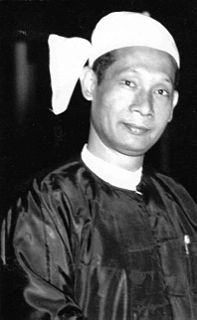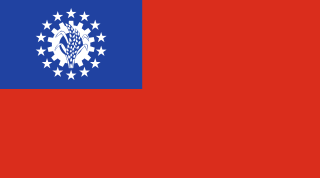| |||||||||||||||||||||||||||||
All 250 seats in the Chamber of Deputies 126 seats needed for a majority | |||||||||||||||||||||||||||||
| Turnout | 66.0% | ||||||||||||||||||||||||||||
| |||||||||||||||||||||||||||||
| |||||||||||||||||||||||||||||
 |
|---|
| This article is part of a series on the politics and government of Myanmar |
|
|
General elections were held in Burma on 6 February 1960 to install a government to take over from General Ne Win's interim administration, established in October 1958. The military-led administration was credited for bringing stability and improving infrastructure in the country, though it suppressed some civil liberties. [1]
Ne Win was a Burmese politician and military commander who served as Prime Minister of Burma from 1958 to 1960 and 1962 to 1974, and also President of Burma from 1962 to 1981. Ne Win was Burma's dictator during the Socialist Burma period from 1962 to 1988.
Civil liberties or personal freedoms are personal guarantees and freedoms that the government cannot abridge, either by law or by judicial interpretation, without due process. Though the scope of the term differs between countries, civil liberties may include the freedom of conscience, freedom of press, freedom of religion, freedom of expression, freedom of assembly, the right to security and liberty, freedom of speech, the right to privacy, the right to equal treatment under the law and due process, the right to a fair trial, and the right to life. Other civil liberties include the right to own property, the right to defend oneself, and the right to bodily integrity. Within the distinctions between civil liberties and other types of liberty, distinctions exist between positive liberty/positive rights and negative liberty/negative rights.
Contents
The elections were seen as not so much a contest between the Clean AFPFL of U Nu against the Stable AFPFL of Kyaw Nyein and Ba Swe, but a referendum on the policies of the interim military government between 1958 and 1960. [2] The result was a victory for the Clean AFPFL, which won 157 of the 250 seats in the Chamber of Deputies.

The Union Party was the ruling political party in Burma in the late 1950s and early 1960s. Formed by a split in the Anti-Fascist People's Freedom League, it was initially known as the Clean AFPFL.

Nu, known honorifically as U Nu or Thakin Nu, was a leading Burmese statesman, politician, nationalist, and political figure of the 20th century. He was the first Prime Minister of Burma under the provisions of the 1947 Constitution of the Union of Burma, from 4 January 1948 to 12 June 1956, again from 28 February 1957 to 28 October 1958, and finally from 4 April 1960 to 2 March 1962.

The Stable AFPFL was a political party in Burma.
The elections set a precedent to other Middle Eastern and South Asian leaders, where the military voluntarily handed over to a civilian government and held free elections. [3] However, only two years after his election victory, U Nu was overthrown by a coup d'état led by General Ne Win on 2 March 1962.

The Middle East is a transcontinental region centered on Western Asia, Turkey, and Egypt. Saudi Arabia is geographically the largest Middle Eastern nation while Bahrain is the smallest. The corresponding adjective is Middle Eastern and the derived noun is Middle Easterner. The term has come into wider usage as a replacement of the term Near East beginning in the early 20th century.

South Asia or Southern Asia, is a term used to represent the southern region of the Asian continent, which comprises the sub-Himalayan SAARC countries and, for some authorities, adjoining countries to the west and east. Topographically, it is dominated by the Indian Plate, which rises above sea level as Nepal and northern parts of India situated south of the Himalayas and the Hindu Kush. South Asia is bounded on the south by the Indian Ocean and on land by West Asia, Central Asia, East Asia, and Southeast Asia.
The 1962 Burmese coup d'état on 2 March 1962 marked the beginning of totalitarian rule and the political dominance of the army in Burma which spanned the course of 26 years. In the coup, the military replaced the civilian AFPFL-government, headed by Prime Minister U Nu, with the Union Revolutionary Council, Chaired by General Ne Win.









